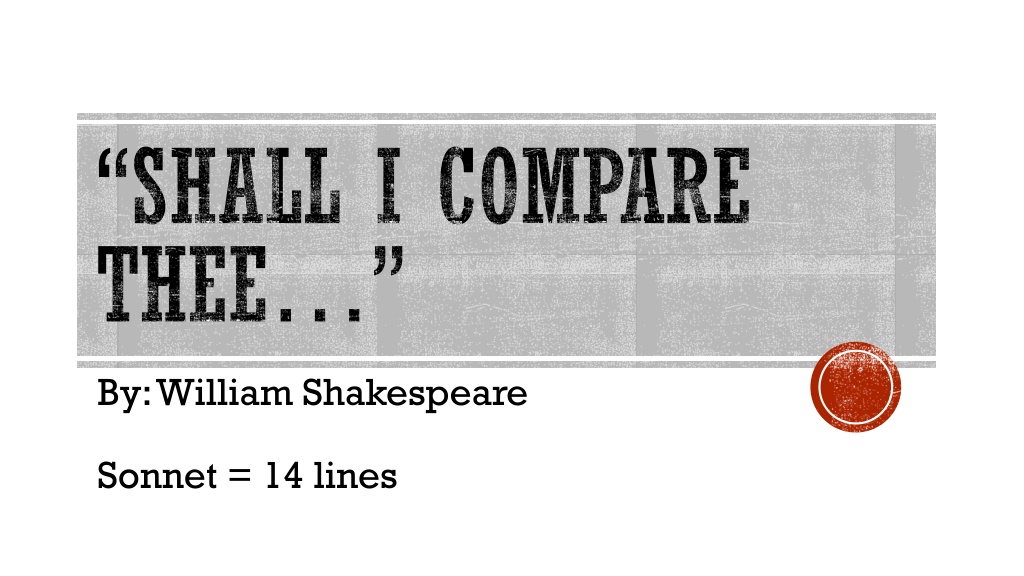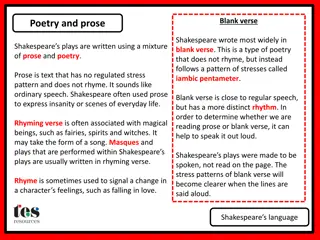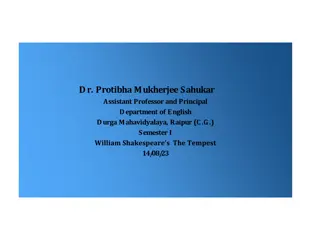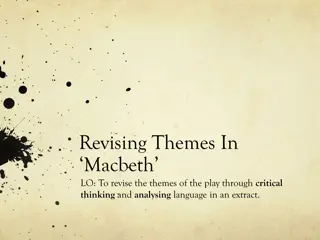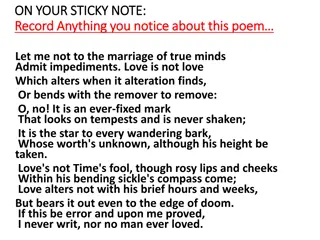Analysis of Shakespeare's Sonnet: Shall I Compare Thee
Shakespeare's Sonnet "Shall I Compare Thee" explores the speaker's admiration for his beloved, claiming she surpasses the beauty of a summer day. The poem delves into themes of eternal love, beauty, and the inevitable fading of physical allure. Through vivid imagery and poetic devices, Shakespeare contrasts the fleeting nature of seasons with the timeless quality of true love, asserting that his lover's beauty will endure beyond the ravages of time and death.
Download Presentation

Please find below an Image/Link to download the presentation.
The content on the website is provided AS IS for your information and personal use only. It may not be sold, licensed, or shared on other websites without obtaining consent from the author. Download presentation by click this link. If you encounter any issues during the download, it is possible that the publisher has removed the file from their server.
E N D
Presentation Transcript
SHALL I COMPARE THEE By: William Shakespeare Sonnet = 14 lines
#1) THOUGHTS? The object of his affection is more perfect than even the most perfect summer day. Nothing can take her beauty away The poem is an ode to her. ???
#2) WHAT EXTRAVAGANT CLAIM IS MADE AT THE START OF THIS POEM? Line 1: Shall I compare thee to a summer s day? The object of his affection can be compared to a beautiful summer day.
#3) WHY DOES SHAKESPEARE THEN SAY HE REFUTES THE CLAIM? Line 2: Thou art more lovely and more temperate. The speaker says that she is MORE lovely than a summer s day.
#4) WHAT IMAGE DOES SHAKESPEARE USE TO DEMONSTRATE THAT SUMMER WEATHER IS UNPREDICTABLE? Line 3: Rough winds do shake the darling buds of May Line 3 uses the image of rough winds shaking something that is pretty and new. This image reflects the life storms that can come our way, and how quickly beauty can change.
#5) WHAT IS THE EYE OF HEAVEN, AND WHY IS IT NOT CONSTANT OR TRUSTWORTHY? Line 5: Sometime too hot the eye of heaven shines Eye of heaven = the sun It s not trustworthy because it can get too hot Sometimes a crush can become too hot to handle
#6) ACCORDING TO LINES 7-8,WHAT MIGHT HAPPEN TO ANY KIND OF BEAUTY? Lines 7-8: And often is his gold complexion dimmed; And every fair from fair sometime declines. Clouds can get in the way. Symbolically, this means that beauty can fade. With age one may not be viewed as quite as beautiful or hot anymore.
#7) IN LINES 9-12, WHAT DOES THE SPEAKER CLAIM WILL NEVER HAPPEN TO HIS LOVER? Lines 9-12: But thy eternal summer shall not fade, Nor lose possession of that fair thou ow st, Nor shall Death brag though wand rest in his shade, When in eternal lines to time thou grow st: She will never lose her beauty. Old age/ death will not take her away.
#8) PERSONIFICATION: Line 11: Nor shall Death brag though wand rest in his shade Death is given humanlike characteristics by use of the verb brag , something that humans can do.
#9) HOW HAS HE ANSWERED THE QUESTION OF FINDING AN APPROPRIATE SIMILE OR METAPHOR TO DESCRIBE THE PERSON HE LOVES? The speaker has not found an appropriate comparison. He says that all normal comparisons are not good enough for his love.
#10) FINAL COUPLET (2 LINES): - WHAT DOES IT MEAN? - WHAT DOES THIS REFER TO? Lines 13-14: So long as men can breathe or eyes can see, So long live this, and this gives life to thee. Summary: As long as people are alive, this sonnet will serve as a tribute to my love. This = this poem, tribute
#11) WHAT IS THE OVERALL TONE OF THE POEM? Tone = Speaker s attitude toward the subject of the writing Positive/ Negative?? Definitely positive! Now, how so, specifically?? Appreciative, Reverent, Dreamy, ???
